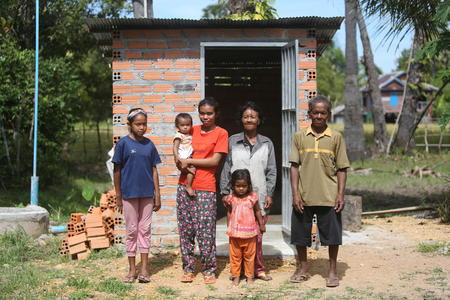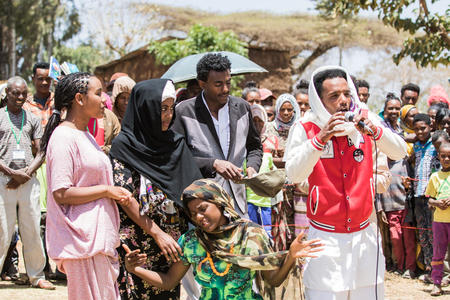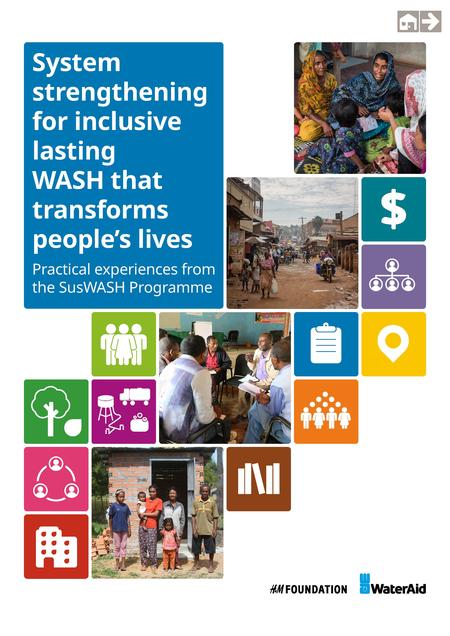System strengthening for inclusive, sustainable WASH: experiences from SusWASH

Hannah Crichton-Smith and Vincent Casey introduce our new report sharing practical experiences, lessons and recommendations from SusWASH, our programme to strengthen water, sanitation and hygiene (WASH) systems in Cambodia, Ethiopia, Uganda and Pakistan.
We have been applying a system strengthening way of working in Cambodia, Ethiopia, Uganda and Pakistan as part of the five-year (2017–22), H&M Foundation-funded, SusWASH programme.
SusWASH was designed on the basis of a detailed analysis of the strength of the WASH system in each focus country, consequently looking different in each country. The programme also includes globally facilitated learning exchange and course correction, and coordinated technical support.
Strengthening WASH systems in Cambodia, Ethiopia, Uganda and Pakistan
In Cambodia, we are helping to strengthen national and provincial monitoring and planning processes for rural WASH. We are also supporting local government to take up their new roles and responsibilities for the promotion of sanitation and operation and maintenance of rural water supply. We are supporting marginalised people to share the challenges they experience in accessing WASH with Government leaders to seek improvements.
In Ethiopia, we are working in a remote rural district to strengthen WASH planning, monitoring and financing. We are strengthening feedback channels between service providers and service users. And we are building the capacity of a small-town water utility and demonstrating water service and school WASH delivery models to Government and others through providing WASH facilities and setting up appropriate management arrangements.
In Uganda, we are working in partnership with Kampala Capital City Authority, the Lord and Municipal Mayors and local council leaders to strengthen Government leadership, coordination and accountability. We are also working with a local civil society organisation to raise the voices of marginalised community members to demand WASH improvements through participatory budget advocacy. We are also demonstrating service delivery models in selected schools and healthcare facilities to Government and others through the providing WASH facilities and setting up appropriate management processes and structures.
In Pakistan, we are working at provincial and district levels to strengthen Government leadership, coordination and planning. We are also supporting improvements to province-wide monitoring of school WASH services and to the delivery of WASH messages in schools through development of WASH teacher training manuals and national school curricula.
The positive outcomes of SusWASH so far
Strengthening WASH systems takes time. However, we’ve already observed many positive changes since we started SusWASH in April 2017:
- In Cambodia, national and provincial WASH action plans have been reviewed by relevant ministries and updated on the basis of up-to-date data helping to inform investment decisions.
- In Ethiopia, a costed district WASH plan has helped to attract additional WASH investment to the district.
- In Uganda, in partnership with others, an order to improve the regulation of sewerage and faecal sludge management in Kampala was passed by Kampala City Council.
- In Pakistan, the province-wide school management information system now includes WASH indicators to enable school WASH status to be monitored and measured over time to inform decision-making.
Our report sharing practical experiences of system strengthening
We are excited to launch our global learning report System strengthening for inclusive lasting WASH that transforms people’s lives: practical experiences from the SusWASH programme. The report includes:
- The background to WASH system strengthening and the SusWASH programme.
- The process taken to design, measure change, learn and adapt.
- Four country case studies that provide an overview of what we have done, the changes we have observed, and what we have learned so far.
- Concluding lessons, recommendations and next steps.
The report is intended for WASH practitioners, fundraisers, governments and donors implementing or funding WASH system strengthening, and those who are interested in doing so.
We hope the report contributes to the global WASH sector’s thinking on system strengthening for greater WASH inclusion, sustainability and achievement of Sustainable Development Goal 6.
Read and download the report here
Hannah Crichton-Smith is Sustainable WASH Advisor at WaterAid, and Vincent Casey is Senior WASH Manager – Water at WaterAid. Join the SusWASH conversation on Twitter: @HCrichtonSmith and @VINNYCASEY2.






